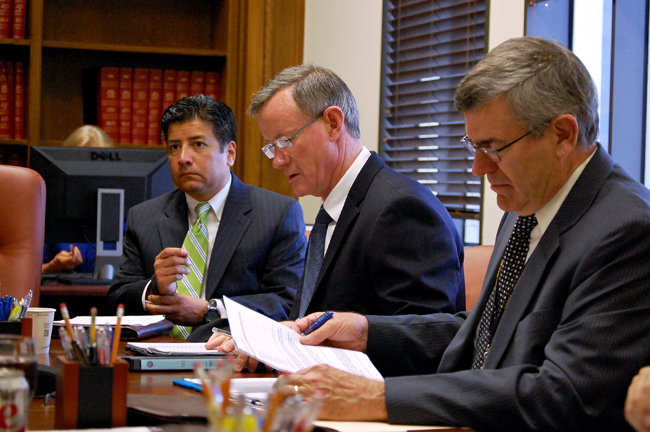The UT System Board of Regents and Chancellor William McRaven sent a letter Monday to Attorney General Ken Paxton arguing that individual regents’ access to records can be subject to limitations in certain situations.
At a specially called meeting Monday morning, eight members of the board voted unanimously to file a brief with the AG’s office outlining the System’s official stance on regent information requests. The ninth regent, Wallace Hall, abstained from the vote.
System counsels filed the brief in response to an appeal Hall’s private attorney filed with Paxton on April 20. Hall’s attorney, Bill Aleshire, asked Paxton to formally provide advice on Hall’s request to review thousands of documents related to UT-Austin admissions and asked whether the Board or the Chancellor had the authority to prohibit Hall from obtaining copies of those records.
Hall is attempting to review the thousands of documents Kroll Associates, Inc. used in an independent investigation earlier this year. The Kroll report found President William Powers Jr. intervened in a handful of admissions cases, but concluded Powers did not violate any policies.
When Hall asked to review the Kroll documents, three regents, including Hall himself, voted to grant him access. Under Regent Rule 19801, “Policy on Transparency, Accountability, and Access to Information,” UT System employees must respond to information requests “without undue delay” if two or more regents vote in support of the request.
However, McRaven told Hall that Hall’s requests ventured into independent “inquiry and investigation” and therefore would require a majority board vote for approval. In a terse email exchange, McRaven told Hall his requests for information go beyond “any reasonable desire to be better informed as a regent.”
“This current request for information … is detrimental to the overall well-being of the system,” McRaven wrote in an email to Hall.
The brief filed Monday, which represented McRaven and the Board of Regents’ official position on Hall’s appeal, argued that Hall’s attorney did not have standing to seek formal advice from Paxton in the first place.
“An individual Regent is not authorized to seek an opinion of the Attorney General in his official capacity without the consent of the Board, nor may an individual Regent be represented in his official capacity by private counsel,” System lawyers wrote. “In addition, the Attorney General generally declines fact-finding and answering hypothetical questions, both of which would be required in answering the questions presented.”
Even if Paxton did agree to provide Hall advice, Hall’s requests for the documents should still be denied, according to the brief. System counsel said Regents’ Rules and federal laws exist to regulate individual regents’ access to records, especially when student privacy is a consideration.
“A Regent’s access to information is not ‘unfettered,’” the System counsel wrote. “Given the potential volume of a request for information by an individual member of the Board and the impact on workload priorities, it is inherently reasonable that the Regents’ Rules provide checks and balances.”
In his letter to Paxton, Hall’s attorney argued that Regents do have an unfettered right to agency records.
“A regent is not a mere figurehead, passive servant of corporate management,” Aleshire wrote. “Other opinions of the Attorney General also demonstrate that a regent’s inherent right of access to the agency records is not subject to judgement of the other board members (or of the Chancellor).”
After the meeting Monday, Regent Alex Cranberg, who originally voted to grant Hall access to the Kroll records, explained his vote in support of the brief to the AG.
“I certainly feel it’s very important to express the need for individual regents to have [the] capacity to ask hard questions, even as the majority of the board might feel uncomfortable, but I don’t think this response suggests that the regents don’t have that capacity,” Cranberg said. “[I believe the response suggests] merely that there might be some limits placed on what a regent might reasonably ask for.”





















